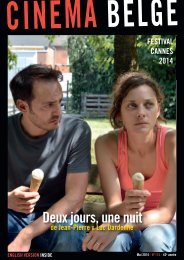CINEMA
Create successful ePaper yourself
Turn your PDF publications into a flip-book with our unique Google optimized e-Paper software.
Update<br />
Centre du Cinéma et de l’Audiovisuel<br />
Breaking down barriers and getting closer!<br />
Cinema in French-speaking Belgium is doing<br />
well, as was demonstrated once again by a<br />
Cannes selection which included three Belgian<br />
films in French, various Belgian coproductions and numerous<br />
talented individuals from our part of the world<br />
(rookie and experienced directors, actors and technicians).<br />
However, now is not the time to start crowing.<br />
Vigilance is still required to keep support and subsidisation<br />
systems in place in response to a context whose<br />
only abiding characteristic is its constant fluctuation. “As<br />
a public body under the auspices of the Federation Wallonia-Brussels,<br />
the role of the Centre for Cinema and<br />
the Audiovisual Sector is to encourage the creation of a<br />
fruitful ecosystem serving the diverse range of Frenchspeaking<br />
Belgian creative output,” stresses Frédéric Delcor,<br />
Director of the CCA - Centre du Cinéma et de<br />
l’Audiovisuel (Centre for Cinema and the Audiovisual<br />
Sector).<br />
The first aspect of such an ecosystem is finance. “With<br />
the Minister of Culture, Fadila Laanan, and the majority<br />
of the sector, we have supported the reform proposed<br />
by the UPFF and its Flemish counterpart.” After a<br />
lengthy passage through the legislative process, this reform<br />
has been approved by the Federal Parliament.<br />
Frédéric Delcor<br />
Director of the CCA<br />
Another measure is the adjustment of the subsidies provided<br />
by the CCA. “To avoid the risk of our productions<br />
being underfunded, we have decided to increase our subsidy<br />
levels.” The amount of aid provided has thus increased<br />
from€350,000 to €425,000 or €500,000 per<br />
film, depending on the case.<br />
Although Belgian input is stronger than before, coproduction<br />
nevertheless remains virtually inevitable as a<br />
model for Belgian films. The CCA has therefore established<br />
coproduction agreements with other countries<br />
such as France, Luxembourg and, more recently, China.<br />
The Netherlands and possibly Brazil and Chile will soon<br />
be added to this list.<br />
The second aspect consists of encouraging diversity in<br />
audiovisual production across all formats. “We have invested<br />
with the RTBF in a fund for the creation of TV<br />
series,” says Frédéric Delcor. In the same vein, the CCA<br />
has maintained its support for all audiovisual formats,<br />
such as short films, documentaries, experimental films<br />
and web creations.<br />
The third aspect is the dissemination of audiovisual<br />
works. “There is a real problem of identity, of knowing<br />
what Francophone Belgian cinema is.” The creation of<br />
this identity is one of the objectives of the Magritte<br />
Award and the Internet platform Cinevox. Ensuring familiarity<br />
with home-grown films is also about venues.<br />
“Starting in 2015, new cinemas will be opened in Brussels<br />
(Pathé Palace), Namur and Charleroi.”<br />
The success of the French-speaking Belgian cinema will<br />
depend on all these aspects coming together, and on its<br />
ability to adjust to a context that is both rich and complex.<br />
■ V.B.<br />
Setting up a cinema support structure that takes all<br />
dimensions into account coherently and systematically<br />
is no easy matter. “Before finalising the negotiation<br />
of the new management contracts of the<br />
Filmfonds and the Mediafonds, a new decree had to be<br />
redrafted and approved by the Flemish government,” says<br />
Pierre Drouot, director of the VAF. This involved intricate<br />
preparatory work, since all the changes that have occurred<br />
in recent years had to be integrated in order to<br />
ensure a better fit with the current context and future initiatives.<br />
VAF (Flemish Audiovisual Fund)<br />
Restructure and reinforce!<br />
The objective of this new configuration is to gather together<br />
all the skills associated with the single screen under<br />
one structure, including support for production, dissemination,<br />
commercialisation and promotion. “That doesn’t<br />
mean this is about concentrating powers. Rather, the<br />
Maison du Film Flamand (Flemish Film Centre) serves as<br />
a single interface with various bodies, each of which has<br />
its own targets, criteria and objectives”.<br />
Today, the Maison du Film Flamand therefore mainly<br />
brings together four funds with their own objectives and<br />
specific characteristics: the Filmfonds (dedicated to all<br />
one-off productions such as short and feature films, animations,<br />
documentaries and experimental films with the<br />
Filmlabs), the Mediafonds (for series), the Gamefonds<br />
(for video games, serious games and educational games)<br />
and Screen Flanders, the economic fund.<br />
Leaving structural aspects aside, it should be noted that<br />
the year has been a particularly fruitful one for Flemish<br />
film, with successes such as Het Vonnis (The Verdict) by<br />
Jan Verheyen, Marina by Stijn Coninx, Kampioen zijn<br />
blijft plezant by Eric Wirix, and The Broken Circle Breakdown<br />
by Felix Van Groeningen.<br />
“We are going for diversity. Each film has its own world.<br />
It is impossible to fit Flemish cinema into a single style.<br />
Pierre Drouot, Director of the VAF<br />
Each film has its own ambitions.” That strategy is paying<br />
off, with Flemish talent being invited to work abroad.<br />
Loft by Erick Van Looy and The Drop by Michael R.<br />
Roskam, produced by Fox Searchlight, are both films that<br />
will be distributed on a large scale in the United States.<br />
“We actually have a twofold objective: to maintain and<br />
expand our relationship with the public in Flanders (and<br />
why not in Brussels and Wallonia too?) both in cinemas<br />
and on the television and, while being aware of the problem<br />
of language, to ensure that our films are known,<br />
recognised and broadcast outside Belgium.” ■ V.B.<br />
Belgian Cinema II May 2014





